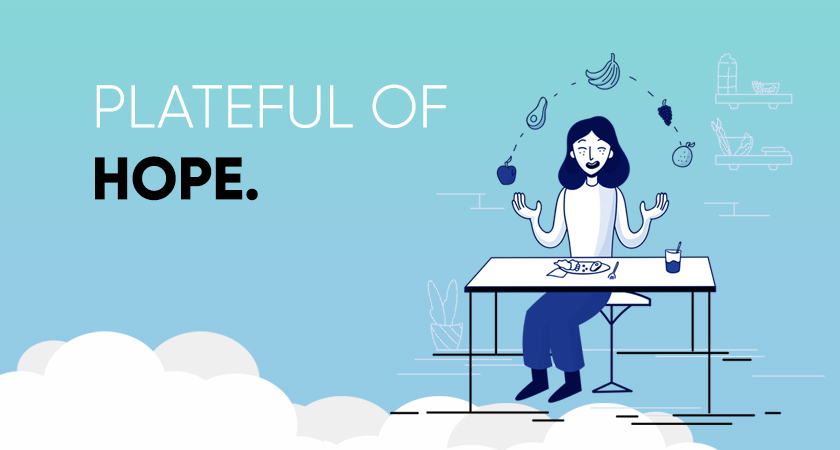Plateful of Hope
Chitresh Sinha: Chlorophyll Innovation Lab
I am the head of Chlorophyll Innovation Lab and the founder of The Plated Project.
During the lockdown, we heard stories about how people have changed. Well, the big change in me is that I have started missing Mumbai traffic. I know, I know. Who loves traffic? I used to hate it before just like everyone else, but now I crave it. And that’s where my story begins exactly a year back: in Mumbai traffic.
I was stuck in my car and was doing what most of us do, scrolling through my Instagram feed. I kept going past images of coffee mugs, dogs, vacations, and selfies and then one image made me pause. The overlaid text said, “Hunger kills more people every year than terrorism, AIDS, and malaria combined.” And then it had a donate now button. I did what most of us would do, scrolled past it. The next ad I saw was for these cool dinner plates which I actually ended up buying as a gift. I then forgot all about these two un-related incidents.
About a week later, my team and I were brainstorming about our next project. One of things that we do every year is to launch one IP of our own that uses design to make a difference with respect to a social issue.
We were all sitting there trying to pick the problem we want to focus on this year. Out of nowhere, the ad from the car popped up in my head and I remembered that according to the text, hunger kills in huge numbers. The actual number is nine million per year. Nine million. It’s incredible and so I mentioned to the team that hunger is one of the world’s biggest problems, and suggested that we do something around that even in some small way. Along the way, I mentioned that last week I bought a dinner set after learning this fact.
And then, just like in the movies, a designer in my team, Dhruvi, connected the dots. She scribbled on the whiteboard: “Buy a plate, fill a plate.” Her idea was to create unique limited edition plates with art on them that we can sell to raise money for hunger-related charities. And that’s how The Plated Project was born.
We decided the best way to validate the idea was to launch it and work out any bumps in the road along the way. After all, the longer we waited the more we were part of the problem and not the solution. So we created a simple website on WIX. Then we created an Instagram account and then just started DMing people asking them to follow us and spread the word. In less than a month, we had 100 artists ready to be a part of the platform. We had painters, sketch artists, cartoonists, and more—some of them just starting out and some very well-known in their circles.
Keeping in mind that in India, one in four kids in a city is malnourished, our first series was launched in October and the idea was to provide mid-day meals for kids in a school in BKC. We made that startling number our theme: a quarter of nostalgia. Six artists illustrated their happiest memories from childhood on plates. Each artist was asked to leave 1/4th of the plate blank to highlight the important ratio. In just a month we managed to sponsor 5000 meals by raising money from selling hundreds of plates via our website.
We were then working on our next series at the start of 2020. Just before the launch, Covid happened.
Over 140 million people lost their jobs in one month across India, with most of these being daily wage earners and migrant workers. We loved our original idea but the situation called on us to adapt to the new needs at hand. We knew that we had to do something so we launched “A Plate Full of Hope” with the aim of sponsoring 100,000 meals for migrant workers. We invited artists to create pieces that depicted hope during the lockdown. Over 200 artists from around the world reached out to us and we then finally created 20 works of art partnering with them.
We then reached out to sponsors since we did not have any money for production ourselves.
We told our sponsors that if they had Rs 1 lakh to donate to charity and they gave that to us we would donate Rs 1.5 lakhs on their behalf to charity. The math was simple. We were asking them to cover production costs and then we were marking up the price of the plates and selling them to customers. We were then donating 100% of the profits to Goonj, India’s largest donation platform.
We launched the series in June and we weren’t sure about how many we would be able to sell.
However, we managed to sell out the entire lot in just a month. In total, we exceeded our goal of 1 lakh meals and ended up sponsoring 1.4 instead.At the moment, we are taking this side-project even more seriously and looking to scale up.
So now you know why I miss Mumbai traffic. Maybe it gives us a chance to slow down a little and to think—to think about how to help someone else. To think about who’s hurting the most and what role we can play in easing their pain a little in order to help them reach their potential in life. Sometimes traffic can lead to magical things.

